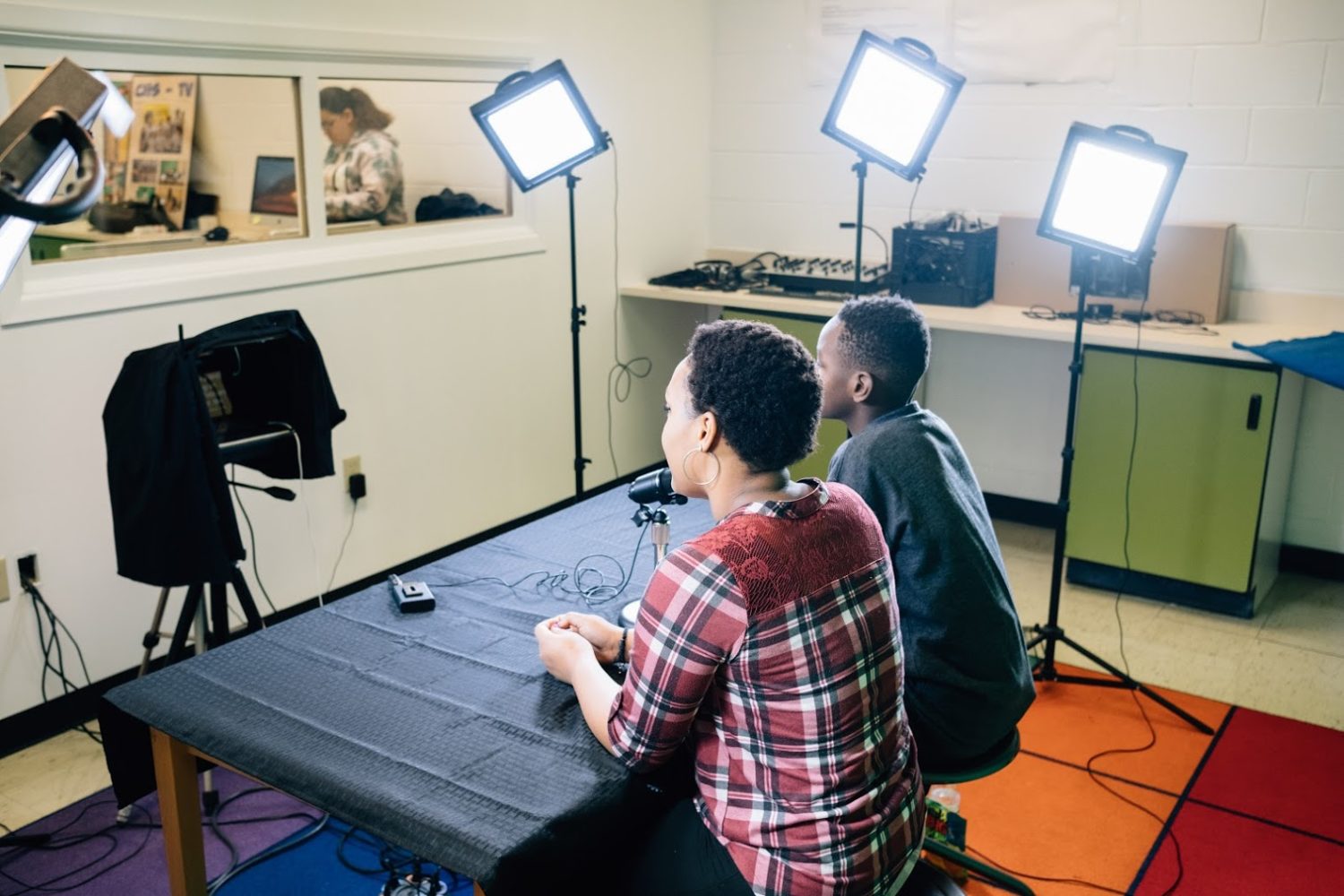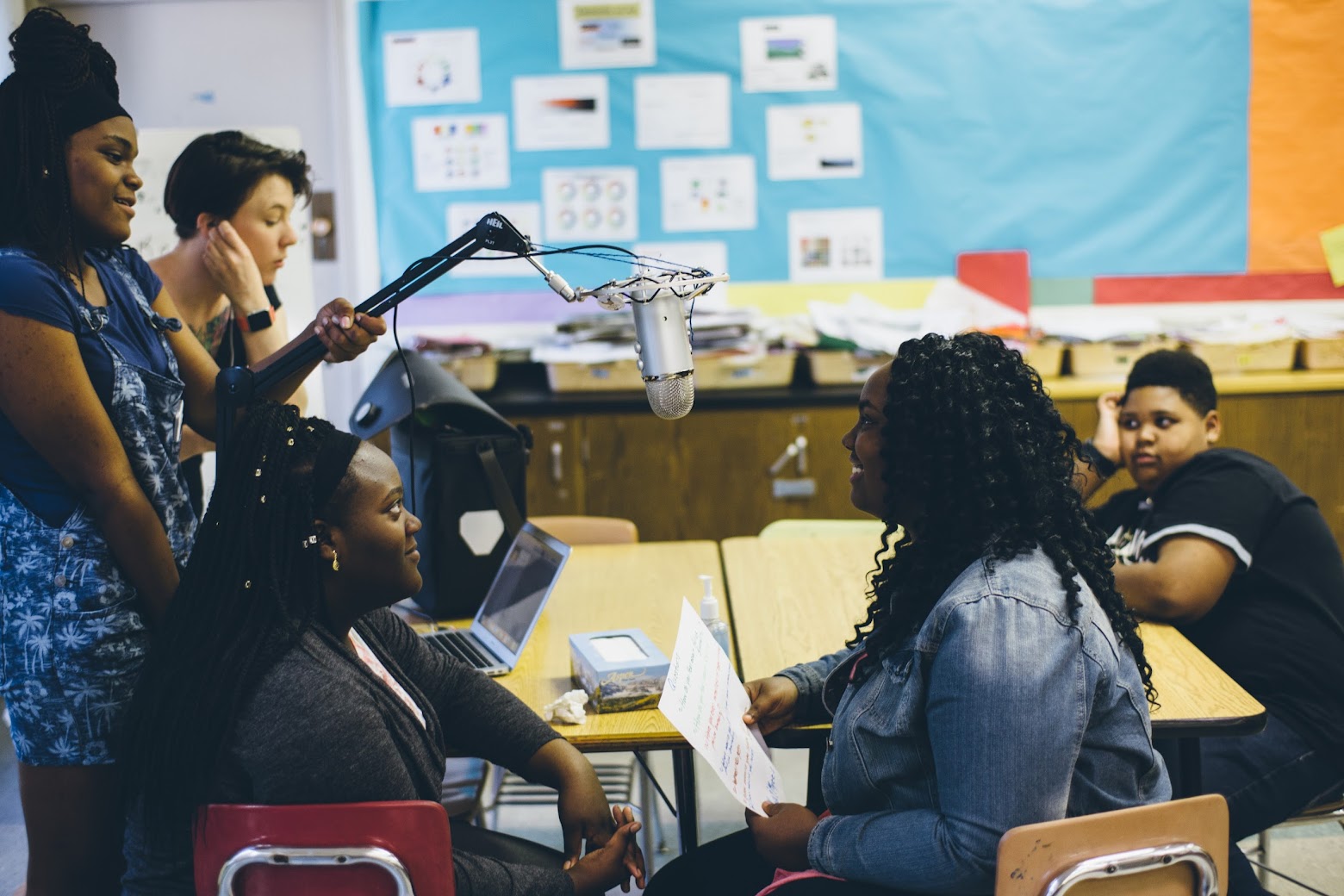
Youth Voice Working Group
Remake Learning’s Youth Voice Working Group worked alongside Pittsburgh area youth to support youth agency and combat ageism in the region.

What is youth voice?
Raising the voices of young people can be both empowering and educational. This topic often refers to one or both of the following practices:
- Teaching young people about the ways in which media messages affect perceptions of themselves and the world around them, and giving them the tools to make their own media and take control of their own stories.
- Prioritizing young people’s perspectives in decisions that affect their learning and lives, often putting them in positions of genuine leadership and power over those decisions
These dual definitions and the complexity they contain mean that youth voice and power has different meanings in different contexts. But both definitions are built on a foundation of respecting young people’s perspectives and empowering them to express themselves. By taking students seriously, and giving them the tools and resources they need to meaningfully act, we challenge them to change the dominant narrative and lead in their learning and their lives.
Remake Learning has a long history of members engaging in projects and programs that build youth voice and power, from education technology products like Message from Me to a multi-organization pathway for students focused on youth voice. Network members that engage in youth voice can be found across the spectrum, including schools, museums, non-profits, libraries, universities, after-school programs, community centers, and beyond.
Youth Voice Working Group
The Youth Voice Working Group was comprised of over 20 organizations in southwestern Pennsylvania and northern West Virginia who focused on the amplification of youth voice. These organizations included Education Uncontained, the Lighthouse Project, Steeltown Entertainment, the CREATE Lab at Carnegie Mellon University, PublicSource, Saturday Light Brigade, Assemble, A+ Schools, UrbanKind Institute, Carlow University’s Youth Media Advocacy Project (YMAP), and more.
The Youth Voice Working Group brought these organizations together to discuss their own practice, stay up to date about work underway, and trade insights gained from working alongside Pittsburgh-area youth. Together with the young people they serve, members of the working group built a hyper-local, nationally-informed standards of practice toolkit to support youth agency and combat ageism in the region.
Youth Voice Standards of Practice Toolkit
When the Youth Voice Working Group began forming in summer 2017, the overwhelming consensus was that in general, adults in this region weren’t listening to what young people were telling them, which created lopsided power dynamics and unjust and inequitable outcomes for youth. When adults work with youth in ways that are engaging, honest, and co-governed, they are better enabled to combat unjust learning environments and create more purposeful outcomes for youth.
The organizations in the group identified ageism as a powerful force to be called out and counteracted in the region to the greatest extent possible. According to John Bell in Understanding Adultism: A Key to Developing Positive Youth-Adult Relationships, “To be successful in our work with young people, we must understand a particular condition of youth: that young people are often mistreated and disrespected simply because they are young. The word adultism refers to behaviors and attitudes based on the assumption that adults are better than young people, and entitled to act upon young people without their agreement. These culturally-reinforced attitudes can result in:
- an undermining of self-confidence and self-esteem
- an increasing feeling of powerlessness
- a consistent experience of not being taken seriously
- an increase in ‘acting out’”
In 2019, the Youth Voice Working Group released a standards of practice toolkit to bring attention to ageism in the region and take steps to address it. The purpose of this toolkit was to help bring attention to ageism in the region and begin to take concrete, evidence-based, hyper-local steps to address it.
Youth Voice Resources
Local Publications
- My Brother’s Keeper Community and Stakeholder Planning Process: Initial Recommendations (UrbanKind Institute)
Based on a series of discussions with young men about needs and gaps in out-of-school programming and ideal program attributes, UrbanKind offers recommendations for funders and service providers as they work to narrow the opportunity gap among young men in the Pittsburgh region. - The Power of Transformative Youth Leadership: A Field Analysis of Youth Organizing in Pittsburgh
Although young people have led many of the great social movements of history, many adults still doubt that young people can lead change efforts in their schools and communities. The research is clear: Youth organizing can have a tremendous impact on individuals, schools, communities and beyond. In this document, we shared our findings and recommendations for field building in youth advocacy and organizing in Pittsburgh. The Funders’ Collaborative on Youth Organizing and the Movement Strategy Center analyzed both research and qualitative responses from local stakeholders to develop a set of specific grant-making strategies through which the Endowments could advance a change agenda for the region. - Youth Voices Study: A Qualitative Study of Youth and the Juvenile Justice System
The report, “A Qualitative Study of Youth and the Juvenile Justice System: A 100 Percent Pittsburgh Pilot Project,” begun in fall 2015 by the Foundation’s Program and Policy staff, to amplify the voices of youth by gathering first-person data from those who have experienced the juvenile justice system or are at risk of being involved with it in Allegheny County.
Study of the role in STEM Education in improving the region’s workforce.
National Publications
- Grip Tape Learner Agency Framework
We believe that when youth have opportunities to drive their own learning and growth — that is, to practice learner agency — it leads to deeper learning and positive youth development. Our beliefs are backed by research studies across disciplines and GripTape’s own rapid learning cycles. - Neutral Zone: Youth Driven Spaces Formative Index
The Formative Index is a compilation of program and organizational practices that helps guide and assess the structural changes sites can implement in adopting the YDS model. - Youth On Board: ListeningWorks
Grounded in Youth on Board’s Action and Support model of 25 years, ListeningWorks trains and supports movement builders and community leaders to harness proven listening, healing-based and human-centered strategies that deepen community activism. - Youth Organizing: A Model for Change In 2016, Nellie Mae hired Alrgorhythm to evaluate the practices of eight Nellie Mae grantees, all focused around youth organizing. While these grantees’ organizing practices varied, there were some common findings across the groups. Overall, key practices for youth organizing include continuously cultivating a membership base, building a deep leadership pool, and taking action at multiple levels (individual, school, and community).